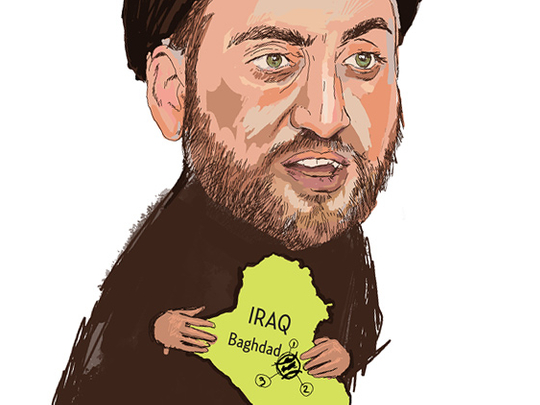
When the 38-year old Ammar Al Hakim succeeded his father as head of the Supreme Iraqi Islamic Council (SIIC) in August, many thought that he would easily be manipulated and abused by many of his father's friends and allies, men who were far older and experienced than him.
Al Hakim, however, has done a very good job at building bridges both within Iraq and with its neighbours, and has recently visited Damascus, Tehran and Riyadh to market himself as a reliable political heavyweight in Iraqi politics.
During the March elections his coalition, the Iraqi National Alliance (INA), put in a solid performance. It did not sweep parliament — as was the case in 2005 — but did enough to be the third-largest bloc, with 70 seats.
Al Hakim would have been satisfied with this, knowing that, even with 91 seats, Eyad Allawi did not have a majority and could not form a Cabinet on his own — this would require 163 seats. None of the aspirants could become prime minister without the full backing of Al Hakim and the SIIC.
This week, Al Hakim and Prime Minister Nouri Al Maliki announced they would merge their two blocs, the INA and Al Maliki's State of Law coalition, which has 89 seats, into one bloc, giving them a total of 159 seats. The remaining four seats required for a majority are relatively easy to obtain.
The writing had been on the wall for weeks, as the two sides openly debated a merger. But only last week, apparently fed up with the prime minister's arrogance, Al Hakim had snapped: "I speak to the politicians and tell them: Come down from your ivory tower and [do away] with your personal ambitions!" Al Hakim was visibly angry with Al Maliki's insistence that no one but he was entitled to the Iraqi premiership. The two men seemed to agree that it was vital to prevent the rise of the secular Allawi, but little else besides.
Al Hakim does not trust Al Maliki, and nor does his ally, Moqtada Al Sadr. Al Maliki came to power in 2006 thanks to the unwavering support of Abdul Aziz Al Hakim (Ammar's father) and Al Sadr, but subsequently turned his back on both of them. Al Sadr supported Al Maliki in 2006-2007, legitimising him among grassroots Iraqis, while the prime minister protected him from the government dragnet, allowing his men to bear arms and create a mini-state in the slums of Baghdad.
Once firmly in power, however, Al Maliki abandoned Al Sadr, prompting the young cleric to tell La Republica: "Between myself and Abu Israa [Al Maliki] there has never been much feeling. I never trusted him. At our last meeting he first told me: ‘You are the country's backbone,' and then he confessed that he was ‘obliged' to combat us. Obliged, you hear me?"
Al Sadr sees Al Maliki as an American stooge who will renege on all promises made to the INA once he is firmly back in power, as he did in 2007. Al Hakim, meanwhile, views the prime minister as a very unreliable ally because of his decision in January 2009 to contest the provincial elections on his own.
This, and his decision to run independently again last March, means that Al Maliki will forever be seen as an opportunist in the eyes of his Shiite allies. Al Hakim, however, is obliged to ally with Al Maliki — at the behest of Iran — to ensure the Shiites are not overwhelmed by secular figures such as Allawi or Sunnis.
The merger does not necessarily mean that everything is resolved. Unless real pressure is applied on Al Maliki by Tehran, he will refuse to accept a compromise candidate for prime minister — certainly not anyone from the INA. Al Hakim himself has no ambition to become prime minister, much like his father and uncle who were "prime minister makers". . The SIIC has long wanted one of its own to become prime minister, such as Adel Abdul Mahdi.
Rivalry
Once this matter is resolved, Al Hakim and Al Sadr need to resolve their differences. For years, Al Sadr had accused Al Hakim's father of being an Iranian stooge, because he fought alongside the Iranians during the Iran-Iraq war in the 1980s. Al Sadr has always boasted that he never fled Iraq — not for a single day during the heyday of the Saddam regime — while the Al Hakim family spent years in Tehran, and were bankrolled and protected by the Iranians.
When Al Hakim toyed with the idea of creating an autonomous Shiite district in southern Iraq, similar to the Kurdish one in the north, Al Sadr was the first to challenge the idea, arguing that pan-Arabism rather than pan-Shiitism should prevail, and that Iraq should remain united.
Now that Abdul Aziz Al Hakim is gone, the rivalry between the two turbaned young men is stronger than ever. They come from heavyweight families that have competed for leadership of the Shiite community for decades, are both sons of legendary figures, and happen to be only two years apart in terms of age.
The longer it takes to find solutions, the more these old rivalries will bubble to the surface, if not between the leaders themselves then between their followers. Al Maliki, Al Hakim and Al Sadr seem to realise that time is not on their side, as Allawi speeds up his PR campaign to promote himself as the only real prime minister.
He met with Al Maliki to score points on Saturday, then surprisingly wrote an article for The New York Times, addressing the US public directly. In Iraq, the ghosts of the past have a way of causing very real problems. Unless genuine solutions are hammered out in Baghdad, the Al Hakim-Al Maliki merger will amount to nothing.
Sami Moubayed is editor-in-chief of Forward Magazine in Syria.










